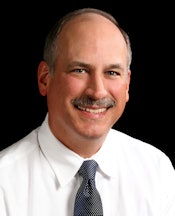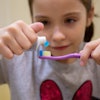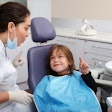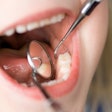
With sedation of pediatric patients remaining an issue for the larger dental community, DrBicuspid.com invited Edward H. Moody Jr., DDS, of Morristown, TN, the president of the American Academy of Pediatric Dentistry, to offer some insight on when to sedate and when not to, what to do if you have a clinically difficult case, and other relevant, practical information. Dr. Moody emphasizes the need for communication among all practitioners, patients, and parents and knowing your limits as a practitioner.
DrBicuspid: When you, as a pediatric dentist, are considering sedation of a pediatric patient, how do you determine the treatment options?
 Edward H. Moody Jr., DDS.
Edward H. Moody Jr., DDS.Dr. Moody: Treatment options are going to be dictated in large part by the extent of the treatment needs that the child has along with the judgment of the clinician as to how the child will or won't tolerate [the treatment]. You have to ask: How deep is the decay? How urgent is this? Is this a situation where we have pain present or likely to be there soon? Are there abscesses? Is this an urgent situation or something that perhaps we can delay a little bit? Can we delay until the child becomes more cooperative?
So it's a question of the dentist using his or her clinical experience to ask relevant questions. Can you give an example?
Let's say you have incipient lesions and some decay, or a couple of carious lesions, but it's something that they aren't going to have a toothache with in the near future. Can you put some temporary material in there just to cover and protect, and maybe buy some time?
If it's a situation where treatment is necessary, then it becomes more problematic, and you begin to ask a different set of questions. Is this something I can do in the office? What is the patient's medical history? What are the risks of this procedure in the office? Should it be done as outpatient anesthesia?
What else do you consider?
The bottom line is you have to weigh the treatment needs, the anticipated behavior of the child, and the medical history.
I also consider how many trips [to the office by the child] will it take me to do this. I don't want to sedate a child several times in the office. The first time is probably going to be as good as you are going to get.
Because of diminishing returns and increased risks?
Yes. The odds are not as good that you'll get that same result the second or third time. If you want that result, then you are talking about maybe taking that drug dosage up, and that's really NOT a good idea. Drug dosage needs to be tailored to the child by weight, and you do not want to get away from that. In my mind, if it's going to take three sedation visits, that's a hospital case.
How do you discuss this with the child's parents or guardians?
Absolutely, you have to sit down with the parents. I tell them, "We have this decay that is urgent, this [decay] that is minimal, and here are the options." You have to tell them in a way they can understand: "Here are the choices." Then you can have a candid discussion about the best way to proceed.
What about the health of a child when you're considering sedation?
If I am even thinking about sedation for a child, I don't want them to have a stuffy nose. I don't want them sick in any way. Mostly, I want to know about any underlying medical issues, such as asthma. That's crucial.
You want a healthy child with a clear nose and clear lungs. Anything out of the ordinary, I am not sedating that child, and I'll treat those patients in the hospital.
How have you seen sedation treatment evolve?
There is a greater tendency to delay or postpone unless there is something urgent. We're less aggressive treating in the office than maybe we were 10 years ago.
Everyone was trained on chloral hydrate, which isn't available anymore. The drug regimens have changed, and people tend to be more cautious now.
There is also more regulation.
Oh, yes. We've seen the states becoming more stringent as to their requirements for training, and you have to have particular monitoring equipment. As new and better monitoring equipment becomes available, we are all looking for something that gives you a warning sooner that potentially you are going to run into a problem.
What do you say to the general dentists?
I get asked this, and to the general practitioner (GP) who sees children, I say, if you get a child with extensive needs, and you are thinking, "Do I do this case in my office or refer to a hospital?" pick up the phone and call your pediatric dentist. We're more than willing to collaborate and help out. Let's do what is best for the child -- it's not a turf issue.
I say, to any dentist, if you don't have training in sedation, refer it. It's not worth going down that road. It is so much easier to make that phone call and tell the parent, "Let's get you set up with someone who does this all the time." Know your limitations, in other words, because if you're not experienced, it's easy to get into a lot of trouble very quickly.



















